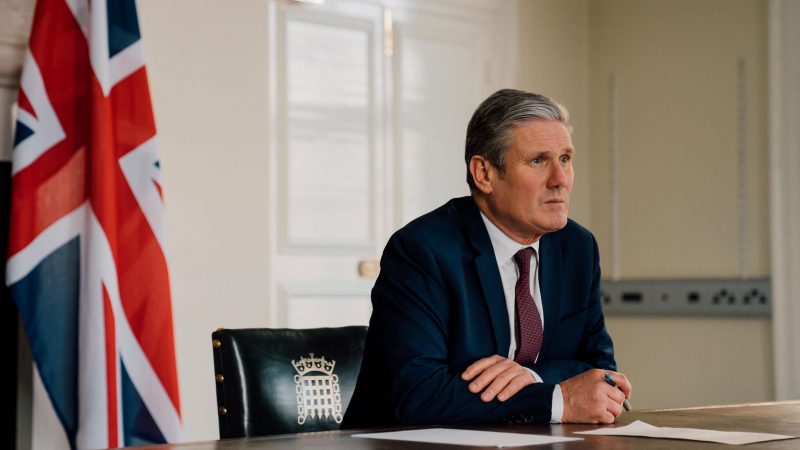
Keir Starmer has called for a general election and declared that the Labour Party is a “changed” party that is “confident” and “preparing to go into power” while the Tories are “completely exhausted” and “clapped out”.
In an interview with The Guardian, published today, the Labour leader revealed that his party is in a position to deliver an election manifesto “at speed”, telling the paper that the government “could fall any time”.
Starmer said: “We are in the absurd situation where we are on the third, fourth Prime Minister in six years and within weeks, we have a got a Prime Minister who has the worst reputational ratings of any Prime Minister pretty well in history.
“Their party is completely exhausted and clapped out. It has got no ideas, it can’t face the future and it has left the UK in a defensive crouch where we are not facing the challenges of the future because we haven’t got a government that could lead us to the future. For the good of the country, we need a general election.”
Asked how confident he is that Labour will win the next election, Starmer said: “I feel very confident in the Labour party. I think what you saw in our conference was a changed Labour party.”
“Almost everybody who attended… they could sense that the mood had changed and that this was a party, which was confident, was assured, and was preparing to go into power. That’s a feeling we haven’t had in the Labour party for a long time. I see this as a once in a generation opportunity,” he added.
Starmer said he had asked his team to ensure the party would have a manifesto ready “at any time, should an election be called”, as he thinks politics is “very, very unstable at the moment”.
He declared: “I’ve not known it this unstable for a long time; the government could fall any time. So we’re in a position to deliver a manifesto at speed, but any time in the coming weeks or months, if necessary.”
Kwasi Kwarteng was sacked as Chancellor today amid the ongoing economic turmoil that has followed the government’s mini-Budget, which was delivered last month. Following the announcement of the mini-Budget, the pound crashed to its lowest level to date against the dollar and government borrowing costs soared.
The Bank of England announced on Tuesday that it was taking emergency action for a third time since the fiscal statement in an attempt to calm the markets.
Starmer admitted that he is “worried” about the state of the economy that the current government may leave, telling The Guardian: “Anybody who’s looked at the numbers in the last few months, but particularly since that kamikaze budget, would be concerned about the state of the economy.”
But the Labour leader stressed that the Tory Party has overseen “not just a few weeks of chaos” but “12 years of failure”, declaring: “We’ve got an economy which has been stagnant, not growing enough for 12 years. We’ve got public services on their knees, if not on their face.
“We’ve got a government run out of ideas, energy and is completely at the end of the road. And now it is in the worst of all states – in denial.”
Liz Truss revealed today that the government will not be going ahead with its proposal to scrap a planned increase in corporation tax, one of the measures set out in the mini-Budget.
The government had already been forced to U-turn on its plans to scrap the 45% rate of income tax on earnings over £150,000, a move which was also announced in Kwarteng’s statement.
It was announced on Tuesday that Starmer’s chief of staff Sam White was leaving his role as part of an accelerated restructuring of key roles in an attempt by the Labour leader to put the party on an “election footing”.
In a statement, the party said Starmer called a meeting with his staff and general secretary David Evans in which he told his team that “the government’s collapse has given us a huge chance”.




More from LabourList
‘What Batley and Spen taught me about standing up to divisive politics’
‘Security in the 21st century means more than just defence’
‘Better the devil you know’: what Gorton and Denton voters say about by-election